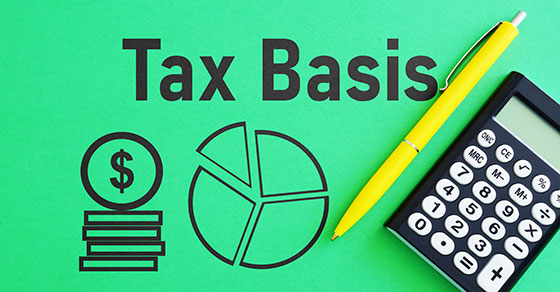There’s a favorable “stepped-up basis” if you inherit property

Under the fair market value basis rules (also known as the “step-up and step-down” rules), an heir receives a basis in inherited property that’s equal to its date-of-death value. So, for example, if your grandfather bought shares in an oil stock in 1940 for $500 and it was worth $5 million at his death, the basis would be stepped up to $5 million for your grandfather’s heirs. That means all of that gain escapes income taxation forever!
The fair market value basis rules apply to inherited property that’s includible in the deceased individual’s gross estate, whether or not a federal estate tax return was filed, and those rules also apply to property inherited from foreign persons, who aren’t subject to U.S. estate tax. The rules apply to the inherited portion of property owned by the inheriting taxpayer jointly with the deceased, but not the portion of jointly held property that the inheriting taxpayer owned before his or her inheritance. The fair market value basis rules also don’t apply to reinvestments of estate assets by fiduciaries.
Lifetime gifting
It’s crucial for you to understand the fair market value basis rules so that you don’t pay more tax than you’re legally required to.
For example, in the above scenario, if your grandfather instead decided to make a gift of the stock during his lifetime (rather than passing it on when he died), the “step-up” in basis (from $500 to $5 million) would be lost. Property acquired by gift that has gone up in value is subject to the “carryover” basis rules. That means the person receiving the gift takes the same basis the donor had in it ($500 in this example), plus a portion of any gift tax the donor pays on the gift.
A “step-down” occurs if someone dies owning property that has declined in value. In that case, the basis is lowered to the date-of-death value. Proper planning calls for seeking to avoid this loss of basis. Giving the property away before death won’t preserve the basis. That’s because when property that has gone down in value is the subject of a gift, the person receiving the gift must take the date of gift value as his or her basis (for purposes of determining his or her loss on a later sale). Therefore, a good strategy for property that has declined in value is for the owner to sell it before death so he or she can enjoy the tax benefits of the loss.
These are the basic rules. Other rules and limits may apply. For example, in some cases, a deceased person’s executor may be able to make an alternate valuation election. And gifts made just before a person dies (sometimes called “death bed gifts”) may be included in the gross estate for tax purposes. Contact us for tax assistance when estate planning or after receiving an inheritance.
© 2023